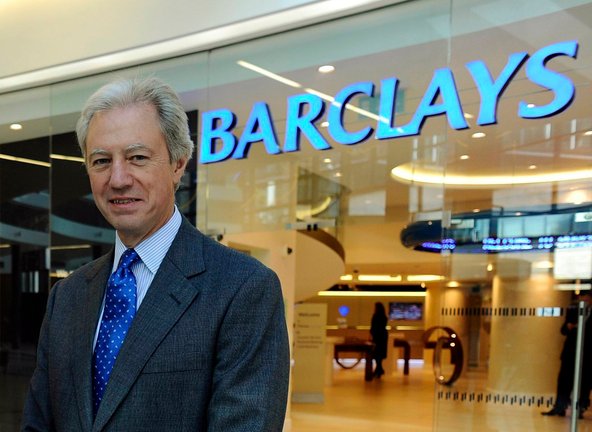 Dylan Martinez/ReutersMarcus Agius, the board chairman, has been a focus of investor dissatisfaction.
Dylan Martinez/ReutersMarcus Agius, the board chairman, has been a focus of investor dissatisfaction.
2:36 a.m. | Updated
LONDON — Marcus Agius, the chairman of Barclays, resigned on Monday, less than a week after the big British bank agreed to pay $450 million to settle accusations that it had tried to manipulate key interest rates to benefit its own bottom line.
The resignation comes as Barclays tries to limit fallout from the case, which is part of a broad investigation into how big banks set certain rates that affect borrowing costs for consumers and companies. Since striking a deal with American and British authorities last Wednesday, the Barclays management team has faced increasing pressure from politicians and shareholders to take action.
“Last week’s events have dealt a devastating blow to Barclays’ reputation,” Mr. Agius said in a statement. “As chairman, I am the ultimate guardian of the bank’s reputation. Accordingly, the buck stops with me and I must acknowledge responsibility by standing aside.”
Mr. Agius, the first casualty, will remain as chairman until a successor has been found. Michael Rake, a senior independent director on the Barclays board and a former chairman of the accounting firm KPMG, has been appointed deputy chairman, according to a statement from the bank.
Barclays also announced on Monday that it will conduct an independent audit of its business practices. The review will center on what led to the rate manipulation and how the issues will affect the bank’s business units in the future. The audit will be used to create new code of conduct for Barclays.
As head of the the British bank’s board, Mr. Agius has been a focus of investor dissatisfaction in recent years.
Shareholders balked at his decision to take capital from Mideast investors during the financial crisis, concerned that the deal did not protect the rights of existing investors. The board has also been criticized for signing off on the multimillion-dollar pay packages of the chief executive, Robert E. Diamond Jr., and other executives, as well as for the lackluster performance of the bank’s shares.
Now Mr. Agius is being held to account for the rate-manipulation scandal that took place under his watch.
A former banker at Lazard, Mr. Agius joined the Barclays board in 2006 and became its chairman in 2007. He is also the honorary chairman of the British Bankers’ Association, the organization that oversees one of the key rates in question, the London interbank offered rate, or Libor. It is unclear whether he will remain in that role after his departure from Barclays.
With the resignation of Mr. Agius, Barclays may be trying to deflect some of the attention away from Mr. Diamond, who ran Barclays’ investment bank during a period when authorities found wrongdoing by traders. Mr. Diamond has come under scrutiny from British politicians, and some have called for him to step down.
While he has dismissed those calls, Mr. Diamond has apologized for the bank’s missteps, saying the behavior was “wholly inappropriate.”
“This kind of conduct has no place in the culture of Barclays,” Mr. Diamond said in a letter to British politicians last week. He and other executives have also agreed to give up their bonuses this year.
Mr. Diamond will be in the line of fire on Wednesday, when he is scheduled to testify before Parliament. Local politicians are expected to question him about the actions within the bank that led to the multimillion-dollar fines from the Justice Department and the Commodity Futures Trading Commission in the United States and the Financial Services Authority in Britain.
“The public’s trust in banks has been even further eroded,” Andrew Tyrie, chairman of the British Parliament’s treasury select committee, said in a statement. “Parliament and the public need to know what went wrong and whether the perpetrators have been rooted out.”
The British government will also start an inquiry this week into a key rate at the center of regulators wide-ranging inquiry.
The rate, Libor, is currently set based on submissions from a number of the world’s largest banks about how much it would cost them to raise money in the capital markets. Such benchmarks are used to help determine the borrowing costs for $750 trillion worth of financial products, including mortgages, credit cards and student loans. The review of Libor is expected to be completed by the end of August.
The integrity of Libor and other key rates have come into question as a result of the multiyear investigation by regulators. A number of banks are under scrutiny, including HSBC, JPMorgan Chase and Citigroup.
In the Barclays settlement, regulators released evidence of what they called “pervasive” wrongdoing by the bank over four years that was aimed at improving its results.
Authorities found that employees in the bank’s treasury department, which helped set Libor, submitted artificially low figures at the request of the firm’s traders, who profited from buying and selling financial products. The two sides are supposed to be divided by so-called Chinese walls to ensure that confidential information is not improperly shared to make profits.
But e-mails showed that the two divisions regularly collaborated in an effort to bolster their profits and avoid scrutiny about the bank’s health at the height of the financial crisis. In part, Barclays wanted to keep its rates in line with those of rivals to keep its “ ‘head below the parapet,’ so that it did not get ‘shot off,’ ” according to regulators.
Mark Scott reported from London and Michael J. de la Merced from New York.
Article source: http://dealbook.nytimes.com/2012/07/01/chairman-of-barclays-is-expected-to-resign/?partner=rss&emc=rss